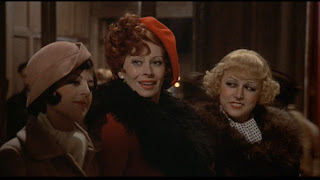Though it was released in late March, I didn't get around to seeing Dreamworks' latest until early May, which makes it eligible for consideration. Though at times overly simplistic or rushed in storytelling or characterization, the film was sweet, generally well told, and featured some of the best flying sequences I've ever seen, 3D or otherwise.
Runner(s) Up: Iron Man 2
If you were to ask people which "Once Upon a Time in..." film from Sergio Leone they prefer, it's difficult to say whether they'd vote for "America" or "the West"(1968). However, my vote easily goes to "America." In stepping away from his Spaghetti Western roots, Sergio Leone's final film is also his greatest. Even at a butt-numbing run time of 3 hrs and 45 minutes, it remains relentlessly engaging, bolstered by clearer story telling than "West," even as it occasionally jumps around in time. Though it can be grim and brutal, there are also moments of understated joy, whether it be when Noodles (Robert DeNiro) takes Deb (Elizabeth McGovern) on a date to a lavish seaside restaurant, or when a younger Noodles and his friends help recover sunken crates of booze from the Hudson River. Under Leone's direction, the moments are strangely touching and even a touch sentimental, but never to the point where it becomes syrupy. As with any Leone film, the production values are stunning, with the standout being Ennio Morricone's magical score. It is a staggering masterpiece on all accounts, and one of the best of 1984 (a year highlighted by films like Amadeus, A Passage to India, and Blood Simple).
Runner(s) Up: TIE Amarcord (1973) and The Hidden Fortress (1958)
In Fellini's long line of Academy Award-winning films, few have approached the level of nostalgia found in Amarcord. Beautifully shot (notably, in color), and filled with moments of humor, sadness, and strangeness, the film's greatest accomplishment is that it fully accomplishes its goal: a slice-of-life portrayal of one year in the life of an Italian village. Where so many slice-of-life films limit their focus, and as a result feel empty and even pretentious, Fellini is wise enough to broaden the looking glass, and the result is a sprawling, engaging, and stunningly mounted look at people's lives, that is handled with grace.
Despite Curtis' odd movements (no doubt a result of his fight with epilepsy) during performances with Joy Division, Riley never makes them cartoonish or over-the-top. Riley's work is a promising breakthrough (as is the film for director Anton Corbijn), as well as a nicely restrained portrait of a man who struggled to understand the condition that would eventually lead to his death.
Runner Up: Ian Holm in The Sweet Hereafter (1997)
While I'm not crazy about the Dardenne brothers' award-winning Cannes entry, the one aspect I can say I liked was its leading lady. In a rather bare-bones, limited perspective script that almost leaves too much to the imagination of the viewer, Dobroshi manages to hold her ground as a woman caught between her duty to a Russian mobster, and the junkie who she's been living in a sham marriage with. Her gaze, while not always openly expressive, does have a quiet way of making you wonder exactly what's going on in her head, especially as she begins to doubt her duties to the barely-seen mobster. In an otherwise iffy (albeit interesting) film, Dobroshi is the only one to make the slightest impact.
Runner Up: Yolande Moreau in Seraphine (2008)
For a film about struggling writers (one of whom is somewhat suicidal), Norwegian writer/director Joachim Trier's film is surprisingly alive. Though heavily influenced by French New Wave, Trier's heavy use of lengthy hypothetical situations is invigorating, and injects a vitality into a style of film making that can often leave people cold. That said, it's not much of an actor's piece, but the cast does a nice job, especially Viktoria Winge as Kari, the estranged girlfriend of Philip (Anders Danielsen-Lee). The quiet music, consisting mostly of ambient tones, adds a nice touch as well, especially during a hypnotic sequence involving Philip traveling to Kari's office. As a statement on the artistic/creative process, as well as one on the way success and failure can irrevocably shift relationships, Trier's debut is undoubtedly a winner.
Though the circus-sized cast of Amarcord would seem like the obvious choice, I'm going with the roughly three-person trio at the center of Claude Lelouch's twisty Roman De Gare. The title is thought of as an expression for a "station novel" (a book you read casually on the train), and Lelouch's film perfectly captures that aesthetic. The film is twisty, turny, and though not entirely memorable, it is wholly engaging. This is in part due to the three intriguing characters, each of whom are much more than they seem. Fanny Ardant and Audrey Dana are there for glamor (the former upscale, the latter more "girl next door"), but it's Dominique Pinon who leads the way as the mysterious Pierre Laclos, who may or may not be an escaped serial killer...or something else entirely. In a film that could have easily gone off the rails (ha), Lelouch's three co-leads help hold this enjoyable Gallic thriller together.
Though the film is built on the performances of Foster and Oscar-nominated Harrelson, the stand out is Steve Buscemi as a grieving father who can't contain his fury over the rehearsed, borderline academic method of notification officers. Buscemi is an actor who is usually used for his quirkiness factor, so seeing him tackle such heavy material is a welcome change, and a reminder of his considerable talent.









No comments:
Post a Comment